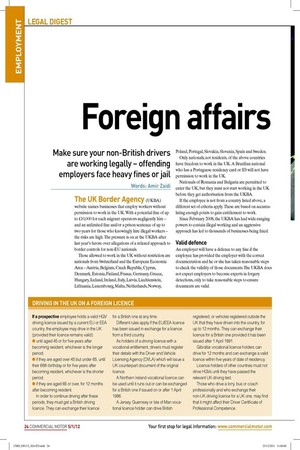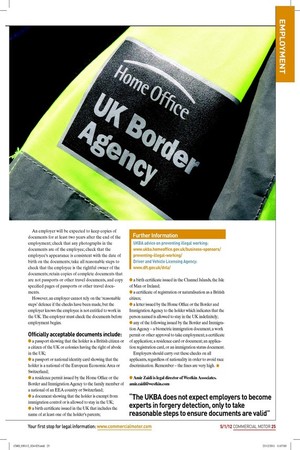Foreign affairs
Page 20

Page 21

If you've noticed an error in this article please click here to report it so we can fix it.
Make sure your non-British drivers are working legally – offending employers face heavy fines or jail
Words: Amir Zaidi The UK Border Agency (UKBA) website names businesses that employ workers without permission to work in the UK. With a potential ine of up to £10,000 for each migrant operators negligently hire – and an unlimited ine and/or a prison sentence of up to two years for those who knowingly hire illegal workers – the risks are high. The pressure is on at the UKBA after last year’s furore over allegations of a relaxed approach to border controls for non-EU nationals.
Those allowed to work in the UK without restriction are nationals from Switzerland and the European Economic Area – Austria, Belgium, Czech Republic, Cyprus, Denmark, Estonia, Finland, France, Germany, Greece, Hungary, Iceland, Ireland, Italy, Latvia, Liechtenstein, Lithuania, Luxembourg, Malta, Netherlands, Norway, Poland, Portugal, Slovakia, Slovenia, Spain and Sweden.
Only nationals, not residents, of the above countries have freedom to work in the UK. A Brazilian national who has a Portuguese residency card or ID will not have permission to work in the UK.
Nationals of Romania and Bulgaria are permitted to enter the UK, but they must not start working in the UK before they get authorisation from the UKBA.
If the employee is not from a country listed above, a different set of criteria apply. These are based on accumulating enough points to gain entitlement to work.
Since February 2008, the UKBA has had wide-ranging powers to contain illegal working and an aggressive approach has led to thousands of businesses being ined.
Valid defence
An employer will have a defence to any ine if the employee has provided the employer with the correct documentation and he or she has taken reasonable steps to check the validity of those documents. The UKBA does not expect employers to become experts in forgery detections, only to take reasonable steps to ensure documents are valid. An employer will be expected to keep copies of documents for at least two years after the end of the employment; check that any photographs in the documents are of the employee; check that the employee’s appearance is consistent with the date of birth on the documents; take all reasonable steps to check that the employee is the rightful owner of the documents; retain copies of complete documents that are not passports or other travel documents, and copy speciied pages of passports or other travel documents.
However, an employer cannot rely on the ‘reasonable steps’ defence if the checks have been made, but the employer knows the employee is not entitled to work in the UK. The employer must check the documents before employment begins.
Officially acceptable documents include:
● a passport showing that the holder is a British citizen or a citizen of the UK or colonies having the right of abode in the UK; ● a passport or national identity card showing that the holder is a national of the European Economic Area or Switzerland; ● a residence permit issued by the Home Ofice or the Border and Immigration Agency to the family member of a national of an EEA country or Switzerland; ● a document showing that the holder is exempt from immigration control or is allowed to stay in the UK; ● a birth certiicate issued in the UK that includes the name of at least one of the holder’s parents; ● a birth certiicate issued in the Channel Islands, the Isle of Man or Ireland; ● a certiicate of registration or naturalisation as a British citizen; ● a letter issued by the Home Ofice or the Border and Immigration Agency to the holder which indicates that the person named is allowed to stay in the UK indeinitely; ● any of the following issued by the Border and Immigration Agency – a biometric immigration document; a work permit or other approval to take employment; a certiicate of application; a residence card or document; an application registration card, or an immigration status document.
Employers should carry out these checks on all applicants, regardless of nationality in order to avoid race discrimination. Remember – the ines are very high. ■ ● Amir Zaidi is legal director of Westkin Associates. amir.zaidi@westkin.com
DRIVING IN THE UK ON A FOREIGN LICENCE
If a prospective employee holds a valid HGV driving licence issued by a current EU or EEA country, the employee may drive in the UK (provided their licence remains valid): • until aged 45 or for five years after becoming resident, whichever is the longer period; • if they are aged over 45 but under 65, until their 66th birthday or for five years after becoming resident, whichever is the shorter period; • if they are aged 65 or over, for 12 months after becoming resident.
In order to continue driving after these periods, they must get a British driving licence. They can exchange their licence for a British one at any time.
Different rules apply if the EU/EEA licence has been issued in exchange for a licence from a third country.
As holders of a driving licence with a vocational entitlement, drivers must register their details with the Driver and Vehicle Licensing Agency (DVLA) which will issue a UK counterpart document of the original licence.
A Northern Ireland vocational licence can be used until it runs out or can be exchanged for a British one if issued on or after 1 April 1986.
A Jersey, Guernsey or Isle of Man vocational licence holder can drive British registered, or vehicles registered outside the UK that they have driven into the country, for up to 12 months. They can exchange their licence for a British one provided it has been issued after 1 April 1991.
Gibraltar vocational licence holders can drive for 12 months and can exchange a valid licence within five years of date of residency.
Licence holders of other countries must not drive HGVs until they have passed the relevant UK driving test.
Those who drive a lorry, bus or coach professionally and who exchange their non-UK driving licence for a UK one, may find that it might affect their Driver Certificate of Professional Competence.
Further Information
UKBA advice on preventing illegal working: www.ukba.homeoffice.gov.uk/business-sponsors/ preventing-illegal-working/ Driver and Vehicle Licensing Agency: www.dft.gov.uk/dvla/













































